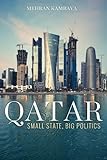Qatar : Small State, Big Politics / Mehran Kamrava.
Material type: TextPublisher: Ithaca, NY : Cornell University Press, [2015]Copyright date: ©2015Edition: With a New PrefaceDescription: 1 online resource (232 p.)Content type:
TextPublisher: Ithaca, NY : Cornell University Press, [2015]Copyright date: ©2015Edition: With a New PrefaceDescription: 1 online resource (232 p.)Content type: - 9780801454318
- Middle East Studies
- Political Science & Political History
- POLITICAL SCIENCE / International Relations / General
- Persian Gulf, independent nations, international relations, regional politics, oil and gas wealth, oil industry, gas industry, international politics, experimental country, the emirate, diplomatic spheres, cultural spheres, economic spheres
- 953.63 23
- DS247.Q35
- online - DeGruyter
| Item type | Current library | Call number | URL | Status | Notes | Barcode | |
|---|---|---|---|---|---|---|---|
 eBook
eBook
|
Biblioteca "Angelicum" Pont. Univ. S.Tommaso d'Aquino Nuvola online | online - DeGruyter (Browse shelf(Opens below)) | Online access | Not for loan (Accesso limitato) | Accesso per gli utenti autorizzati / Access for authorized users | (dgr)9780801454318 |
Browsing Biblioteca "Angelicum" Pont. Univ. S.Tommaso d'Aquino shelves, Shelving location: Nuvola online Close shelf browser (Hides shelf browser)

|

|

|

|

|

|

|
||
| online - DeGruyter Demanding Devaluation : Exchange Rate Politics in the Developing World / | online - DeGruyter Household Accounts : Working-Class Family Economies in the Interwar United States / | online - DeGruyter Transcending Capitalism : Visions of a New Society in Modern American Thought / | online - DeGruyter Qatar : Small State, Big Politics / | online - DeGruyter Claiming the Pen : Women and Intellectual Life in the Early American South / | online - DeGruyter Infamous Commerce : Prostitution in Eighteenth-Century British Literature and Culture / | online - DeGruyter The Senses of Humor : Self and Laughter in Modern America / |
Frontmatter -- Contents -- Preface to the Paperback Edition -- Acknowledgments -- Introduction -- 1. Setting the Stage -- 2. The Subtle Powers of a Small State -- 3. Foreign Policy and Power Projection -- 4. The Stability of Royal Autocracy -- 5. State Capacity and High Modernism -- 6. Qatar’s Moment in History -- Notes -- Bibliography -- Index
restricted access online access with authorization star
http://purl.org/coar/access_right/c_16ec
The Persian Gulf state of Qatar has fewer than 2 million inhabitants, virtually no potable water, and has been an independent nation only since 1971. Yet its enormous oil and gas wealth has permitted the ruling al Thani family to exert a disproportionately large influence on regional and even international politics. Qatar is, as Mehran Kamrava explains in this knowledgeable and incisive account of the emirate, a "tiny giant": although severely lacking in most measures of state power, it is highly influential in diplomatic, cultural, and economic spheres.Kamrava presents Qatar as an experimental country, building a new society while exerting what he calls "subtle power." It is both the headquarters of the global media network Al Jazeera and the site of the U.S. Central Command's Forward Headquarters and the Combined Air Operations Center. Qatar has been a major player during the European financial crisis, it has become a showplace for renowned architects, several U.S. universities have established campuses there, and it will host the FIFA World Cup in 2022. Qatar's effective use of its subtle power, Kamrava argues, challenges how we understand the role of small states in the global system. Given the Gulf state's outsized influence on regional and international affairs, this book is a critical and timely account of contemporary Qatari politics and society.
Mode of access: Internet via World Wide Web.
In English.
Description based on online resource; title from PDF title page (publisher's Web site, viewed 26. Apr 2024)


